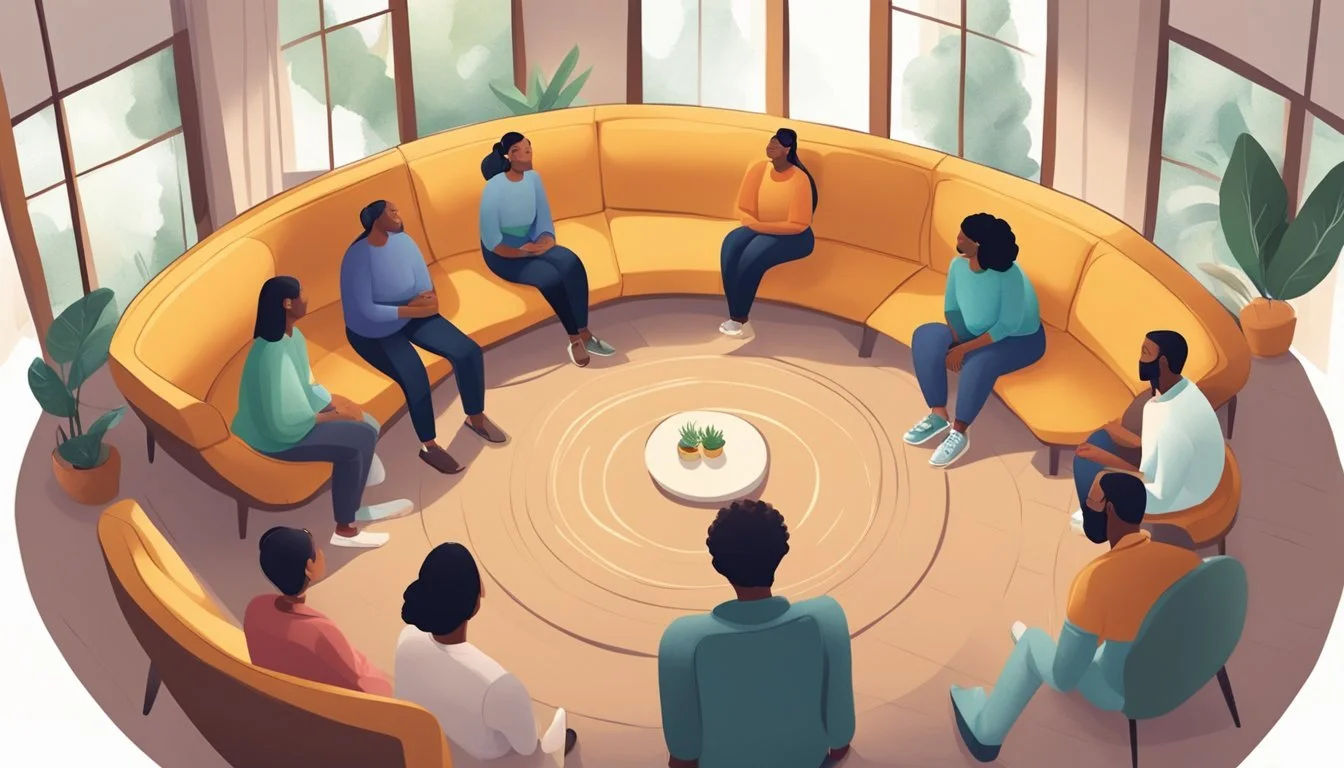9 Strategies for Emotional Healing After Psychopathic Abuse
Reclaiming Your Life and Well-being
Recovering from psychopathic abuse is a challenging but crucial journey towards healing and reclaiming one's life. The emotional aftermath of such abuse can be devastating, leaving survivors feeling lost, confused, and unsure of how to move forward. I've identified nine key strategies that can help guide individuals through the process of emotional healing after experiencing psychopathic abuse.
These strategies are designed to empower survivors, rebuild their sense of self, and foster resilience in the face of trauma. By implementing these approaches, individuals can begin to untangle the web of manipulation and deceit they've endured, and take meaningful steps towards regaining control of their lives and emotions. The road to recovery may be long, but with the right tools and support, healing is possible.
1) Therapy with a Trauma Specialist
Seeking therapy with a trauma specialist is a crucial step in healing from psychopathic abuse. I've found that these professionals have specialized training to address the unique challenges survivors face.
A trauma-informed therapist can help me process my experiences and develop coping strategies. They use evidence-based techniques like cognitive-behavioral therapy (CBT) or eye movement desensitization and reprocessing (EMDR) to address trauma symptoms.
In therapy, I can work on rebuilding my self-esteem and setting healthy boundaries. These are often deeply affected by psychopathic abuse, and professional guidance can be invaluable in restoring them.
A skilled therapist provides a safe, non-judgmental space for me to explore my emotions and experiences. This environment allows for gradual healing and the development of trust, which may have been severely damaged by the abuse.
Therapy also offers tools to manage anxiety, depression, and PTSD symptoms that often accompany psychopathic abuse. With professional support, I can learn to recognize triggers and develop healthier coping mechanisms.
Regular sessions with a trauma specialist can help me regain a sense of control and empowerment in my life. This is essential for long-term recovery and moving forward after the abuse.
2) Reading 'The Body Keeps the Score' by Bessel van der Kolk
I found 'The Body Keeps the Score' by Dr. Bessel van der Kolk to be an invaluable resource for understanding trauma's impact on the mind and body. This book offers deep insights into how traumatic experiences, including psychopathic abuse, can reshape our brain and physiology.
Dr. van der Kolk's work draws on over three decades of experience with trauma survivors. He explains how trauma can compromise our capacity for pleasure, engagement, self-control, and trust.
The book explores scientific advances in trauma research. It demonstrates how trauma affects both mental and physical health, providing a comprehensive view of its far-reaching consequences.
I appreciated the author's focus on various treatment approaches. Van der Kolk discusses methods that aim to heal both the body and mind, offering hope for recovery and the possibility of joy after trauma.
Reading this book helped me better understand my own experiences with psychopathic abuse. It validated many of my symptoms and reactions, which I found deeply reassuring.
3) Joining a Support Group
Joining a support group can be a powerful step in healing after psychopathic abuse. I've found that connecting with others who have shared similar experiences can provide immense comfort and validation.
Support groups offer a safe space to share stories, emotions, and coping strategies. In these groups, I can learn from others who are further along in their healing journey and gain valuable insights.
Many support groups are led by trained facilitators who can provide guidance and resources. Some groups focus specifically on recovery from psychopathic abuse, while others may address broader topics like toxic relationships or trauma recovery.
I can find support groups through local community centers, mental health clinics, or online platforms. Virtual support groups have become increasingly popular, offering flexibility and accessibility.
Participating in a support group helps combat the isolation often experienced after psychopathic abuse. It reminds me that I'm not alone in my struggles and that recovery is possible.
While support groups are beneficial, it's important to find one that feels right for me. I may need to try a few different groups before finding the best fit.
4) Practicing Mindfulness Meditation
Mindfulness meditation can be a powerful tool for emotional healing after psychopathic abuse. I've found it helps reconnect with my body and emotions in the present moment.
One effective technique I use is the body scan meditation. It involves focusing my attention on different parts of my body, noticing any sensations without judgment.
Another helpful practice is mindful breathing. I focus on my breath, observing its natural rhythm. This anchors me to the present and helps calm my nervous system.
Loving-kindness meditation has also been beneficial in my healing journey. I direct feelings of compassion towards myself and others, which helps counteract negative emotions.
Regular mindfulness practice has improved my attention and sleep quality. It's also helped me manage stress and anxiety related to past trauma.
I've discovered that mindfulness allows me to observe my thoughts and feelings with greater acceptance and balance. This has been crucial in processing difficult emotions tied to the abuse I experienced.
5) Writing in a Trauma Recovery Journal
I've found that keeping a trauma recovery journal can be a powerful tool for emotional healing after psychopathic abuse. It provides a safe space to express thoughts and feelings without judgment.
When I write in my journal, I focus on the present moment and my current emotions. This helps me process recent experiences and stay grounded.
I often use prompts to guide my writing. Questions like "What am I feeling right now?" or "What's one small positive thing that happened today?" can be helpful starting points.
Some days I make lists of my strengths or things I'm grateful for. This reminds me of my resilience and the good things in my life, even during difficult times.
I try to write regularly, even if it's just for a few minutes. Consistency is more important than length. Over time, I can look back and see patterns or progress in my healing journey.
Writing about traumatic memories can be challenging. I'm careful to pace myself and take breaks when needed. If certain topics feel too overwhelming, I redirect to gentler prompts.
6) Engaging in Physical Exercise
Physical exercise can be a powerful tool for emotional healing after psychopathic abuse. I've found that regular workouts help release pent-up stress and tension from trauma. Even simple activities like walking or stretching can make a difference.
Exercise stimulates the production of endorphins, which are natural mood boosters. This can help counteract feelings of depression or anxiety that often accompany abuse recovery. I recommend finding an activity you genuinely enjoy to make it sustainable.
Yoga and tai chi are particularly beneficial, as they combine physical movement with mindfulness. These practices can help reconnect mind and body, which is often disrupted by abuse. They also teach breathing techniques that can be used to manage anxiety.
Team sports or group fitness classes can provide social connection, which is important for healing. However, it's essential to listen to your body and not push too hard. Start slowly and gradually increase intensity as you feel comfortable.
Remember, exercise is just one part of the healing process. It works best when combined with other strategies like therapy and self-care. Always consult a healthcare professional before starting a new exercise regimen, especially if you have any health concerns.
7) Setting and Maintaining Boundaries
Setting clear boundaries is crucial for emotional recovery after psychopathic abuse. I've found that establishing firm limits on acceptable behavior from others, including the abuser and those in my support network, is essential.
This process involves clearly communicating my personal needs and expectations. I express what I will and will not tolerate in relationships moving forward.
I've learned to say "no" without guilt and to prioritize my own well-being. This includes limiting contact with toxic individuals and avoiding situations that make me uncomfortable.
I've also recognized the importance of respecting my own boundaries. This means following through on the limits I've set, even when it's challenging.
Maintaining boundaries requires ongoing effort and self-awareness. I regularly reassess my boundaries and adjust them as needed to ensure they continue to serve my emotional healing.
I've found that surrounding myself with supportive people who respect my boundaries has been invaluable in my recovery journey. These relationships help reinforce the importance of healthy limits.
By consistently setting and maintaining boundaries, I've regained a sense of control and safety in my life. This has been a powerful tool in my emotional healing process.
8) Practicing Self-Compassion
Self-compassion is a powerful tool for emotional healing after psychopathic abuse. I've found that treating myself with kindness and understanding can make a significant difference in the recovery process.
One effective strategy is to speak to myself as I would to a dear friend going through a similar situation. This helps me cultivate a more gentle and supportive inner voice.
Recognizing that imperfection is part of being human is another crucial aspect of self-compassion. I remind myself that I'm not alone in my struggles and that many others have faced similar challenges.
By embracing self-compassion, I create a nurturing internal environment that fosters emotional healing. This approach helps rebuild my self-esteem, which may have been damaged by the abuse.
I practice self-compassion by acknowledging my pain without judgment and offering myself comfort and support. This might involve positive self-talk, engaging in self-care activities, or simply taking a moment to breathe deeply and be present with my emotions.
9) Exploring Art Therapy
Art therapy can be a powerful tool for emotional healing after psychopathic abuse. I've found that creative expression often helps survivors process their experiences in a non-verbal way.
Through painting, drawing, sculpting, or other artistic mediums, individuals can externalize difficult emotions and traumatic memories. This can provide a sense of relief and distance from the pain.
Art therapy also fosters self-discovery and rebuilding identity. Creating art allows survivors to reconnect with their authentic selves and rediscover personal strengths.
The process of making art can be meditative and calming for the nervous system. It may help reduce anxiety, depression, and PTSD symptoms common after psychopathic abuse.
I recommend trying different art forms to see what resonates. There's no need for artistic skill - the therapeutic benefits come from the creative process itself, not the final product.
Working with a trained art therapist can provide additional support and guidance. They can help interpret the symbolism and emotions expressed through the artwork.
For those not ready for formal therapy, even simple creative activities at home can be beneficial. Coloring, doodling, or keeping a visual journal are accessible starting points.
Understanding Psychopathic Abuse
Psychopathic abuse is a severe form of emotional manipulation and exploitation. I'll explain its key characteristics and the profound impact it can have on victims' mental and emotional well-being.
Characteristics of Psychopathic Abuse
Psychopathic abusers often display a lack of empathy and remorse. They're skilled at manipulating emotions and may use charm to gain trust initially.
I've observed that these individuals frequently engage in gaslighting, making victims question their own reality. They may also employ love bombing tactics early in relationships.
Psychopaths tend to be pathological liars and can maintain facades convincingly. They often have a grandiose sense of self-worth and feel entitled to exploit others.
Control is a central theme in psychopathic abuse. The abuser may use threats, intimidation, or subtle coercion to maintain dominance over their victim.
Impact on Mental and Emotional Well-Being
Victims of psychopathic abuse often experience severe anxiety and depression. The constant manipulation can lead to a loss of self-esteem and identity confusion.
I've seen how this type of abuse can result in complex PTSD, characterized by flashbacks, hypervigilance, and difficulty trusting others.
Many survivors struggle with feelings of shame and self-blame, even though the abuse wasn't their fault. They may have trouble setting boundaries in future relationships.
The emotional toll can manifest physically, leading to sleep disturbances, chronic pain, and other stress-related health issues.
Cognitive function may be impaired, with victims reporting memory problems and difficulty concentrating. Financial and social impacts are common as well.
Building Self-Awareness
Self-awareness is a crucial element in healing from psychopathic abuse. I've found it empowers survivors to recognize harmful patterns and take control of their emotional responses.
Recognizing Patterns of Behavior
I've observed that many survivors struggle to identify recurring behavioral patterns stemming from their abuse. It's important to reflect on past relationships and interactions to spot these tendencies. I recommend keeping a journal to track thoughts, feelings, and reactions in various situations. This practice can reveal unconscious behaviors like people-pleasing or self-sabotage.
Analyzing these patterns helps pinpoint areas for personal growth. I encourage survivors to be patient and compassionate with themselves during this process. It takes time to unlearn ingrained behaviors.
Identifying Personal Triggers
Recognizing triggers is essential for managing emotional responses. I advise survivors to pay close attention to situations, words, or actions that provoke strong reactions. These might include specific phrases, tones of voice, or even certain facial expressions.
Creating a list of identified triggers can be helpful. I suggest noting:
The trigger
The emotional response
Physical sensations experienced
This awareness allows for the development of coping strategies. Deep breathing exercises or grounding techniques can be effective when triggered. I remind survivors that it's okay to remove themselves from triggering situations when necessary.
Seeking Professional Help
Professional support is invaluable for emotional healing after psychopathic abuse. I recommend exploring therapy options and finding a therapist who specializes in trauma and abuse recovery.
Types of Therapy for Emotional Healing
Cognitive Behavioral Therapy (CBT) can help restructure negative thought patterns stemming from abuse. I've found it effective for building coping skills and improving self-esteem.
Trauma-Focused CBT specifically addresses trauma symptoms. It incorporates techniques like exposure therapy and cognitive processing.
Eye Movement Desensitization and Reprocessing (EMDR) is another powerful option. It helps process traumatic memories through guided eye movements.
Group therapy provides a supportive environment to connect with others who've had similar experiences. Sharing and learning from peers can be deeply healing.
Finding the Right Therapist
I suggest starting by looking for therapists who specialize in trauma, abuse recovery, or personality disorders. Check their credentials and experience treating psychopathic abuse survivors.
Ask potential therapists about their approach and treatment methods. It's important to find someone you feel comfortable with and trust.
Consider trying a few initial sessions with different therapists. This can help you find the best fit for your needs and communication style.
Don't hesitate to switch therapists if you feel the relationship isn't working. A strong therapeutic alliance is crucial for effective healing.









